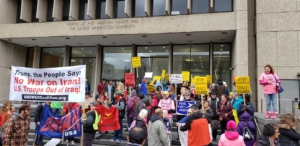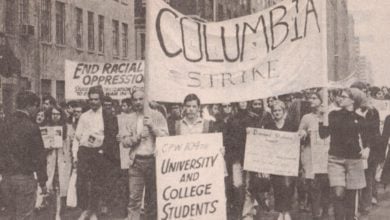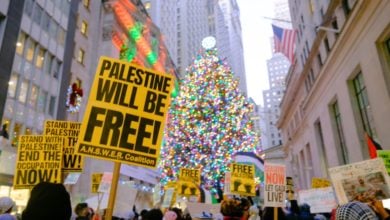
Hundreds of people rallied in front of the White House in Washington, D.C., on Saturday as part of the Global Day of Protest against a U.S. war with Iran. The U.S. capital was just one of more than 220 cities around the world in which defenders of peace came out in protest, including upwards of four million Iraqis who marched the day prior, demanding U.S. troops withdraw from their country.
“The interests of empire are not the interests of you or me,” said Sean Blackmon of Act Now to Stop War and End Racism (ANSWER), who served as the rally’s MC. Recalling Dr. Martin Luther King’s saying that “the bombs in Vietnam explode at home,” Blackmon noted that “a war against Iran, the occupation of Iraq, is a war on each and every one of us.”
“For the people of Iran, there is a war going on,” Code Pink cofounder Medea Benjamin said. “Sanctions are not an alternative to war,” she explained, they are another type of war and their existence makes it more likely a shooting war will happen.
Likewise, ANSWER Coalition national co-director Brian Becker said it would be “a catastrophic mistake” for the antiwar movement to relax because war doesn’t seem as imminent as it did a few weeks ago. He described a possible future scenario in which the U.S. ignores the wishes of the Iraqi people and refuses to withdraw its troops, leading to attacks on U.S. forces in Iraq. Becker noted the U.S. government and media would blame these attacks on “Iran-backed militias,” creating a new war crisis.
In addition to ANSWER and Code Pink, groups in attendance included the Party for Socialism and Liberation, Anakbayan-USA, Veterans for Peace, George Washington University Students Against Imperialism, the National Iranian American Council, the Poor People’s Campaign and many others.
Education about the destructive effects of U.S. sanctions on Iran was a major theme of the event, with Iranian Americans telling the crowd about loved ones back in Iran who had died from cancer or other diseases because they were unable to access the necessary treatments due to the sanctions.
For example, 15 children with the rare skin condition Epidermolysis bullosa have died in Iran since the sanctions were reinstated because Iranian doctors could not import the necessary medicine from Europe.
Donna Farvard of NIAC noted the U.S. has “been on a path to war since Donald Trump pulled us out of the Iran nuclear agreement. We had the path to diplomacy with Iran, we had taken war with Iran off the table,” she said, noting that the “maximum pressure sanctions campaign has stifled the Iranian people, it has limited access to medicine in Iran … You have people who are worried about whether or not they will be able to put food on the table.”
But it’s not only Iranians in Iran who are being affected by the U.S. drive toward war: Iranians in the U.S. are seeing their civil rights eroded as the US government regards their very nationality as itself suspicious. Since August, at least 16 Iranian students traveling to the U.S. to study have suddenly had their visas revoked, being detained and interrogated for hours upon their arrival at US airports before being deported.
In addition, a U.S. Customs and Border Protection whistleblower revealed earlier this month that CBP officers had ordered the “extreme vetting” of dozens of Iranians crossing the border from Canada to Washington State simply on the basis that they had been born in Iran.
“You have law enforcement, even Mayor [Muriel] Bowser of D.C., tweeting, insinuating that Iranian-American communities are potential threats to the rest of the local community,” Farvard told the crowd. “This is a direct result of the relationship between the U.S. and Iran and this path to war that Donald Trump has put us on.”
Rev. Graylan Hagler from the Poor People’s Campaign noted the interconnecting links between racism, militarism, and poverty, and the necessity of struggling against all three. “War has to do with making a few people rich at the expense of everybody else … There is a racist, white supremacist quality to all of this.”
Famed Iranian poet Fatemeh Keshavarz urged the crowd to proactively humanize the Iranian people on social media by sharing images and stories from everyday life in Iran in order to emphasize that Iranians are just like Americans and not “faceless, nameless threats.” She noted the Iranian love of literature, as exemplified by the extremely high literacy rate and the 2.5 million people who travel to Tehran for its annual book fair, and that 70 percent of university students are women. Keshavarz later shared some of her poetry at the teach-in, part of a Persian tradition going back thousands of years.
The rally was followed by a spirited, militant march through downtown D.C. and the campus of George Washington University as protesters chanted “no justice, no peace! U.S. out of the Middle East!” The march led to an auditorium reserved for the teach-in, but which university security temporarily attempted to block the protesters from using.
However, once inside, GWU SAI hosted a teach-in where anti-war organizers discussed methods of organizing and resistance to U.S. imperialism, from union militancy to student movements, and how to tie different movements together.
Yasemin Zahara, a member of U.S. Labor Against the War and the PSL, noted the unique ability of the socialist movement to knit different causes together into a single coherent force, urging the attendees to anchor their organizing in the socialist movement. “Organizing is about bringing more people to the fight … We have to connect to a mass socialist party. It’s not enough to know what we’re against, we also have to know what we’re for. We have to be for socialism, because the opposite of a society that is based in profits and greed is socialism.”
Journalist Anya Parampil noted the necessity of a permanent anti-war movement to resist the “permanent anti-war state,” pointing out that one-third of the world’s population is under one kind of U.S. sanctions or another.
“They would like to cordon off and lock up any community that resists U.S. imperialism,” she said, whether its Iran, ringed by U.S. military bases and crushing sanctions; Gaza placed under a “medieval-style siege” by Israel; or predominantly Black cities inside the U.S. like Baltimore, where “militarized police forces act like occupation armies and the people are cut off from basic resources.”
As the event drew to a close, Code Pink national co-director Ariel Gold presented a letter to the Iranian people expressing solidarity and a desire for peace. Gold also invited people to contribute their own letters or notes, which Code Pink members will deliver along with the organization’s letter, on a future trip to Iran.
No war on Iran! No sanctions! U.S. out of Iraq!




